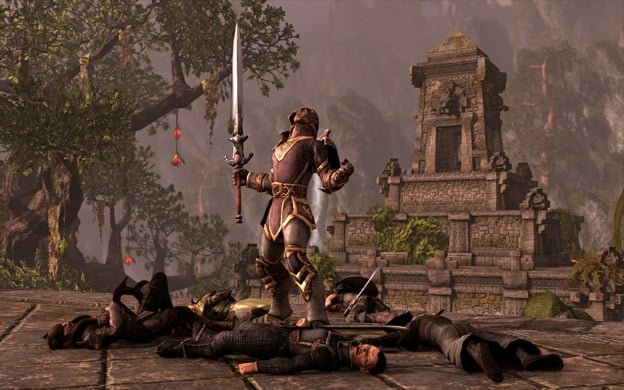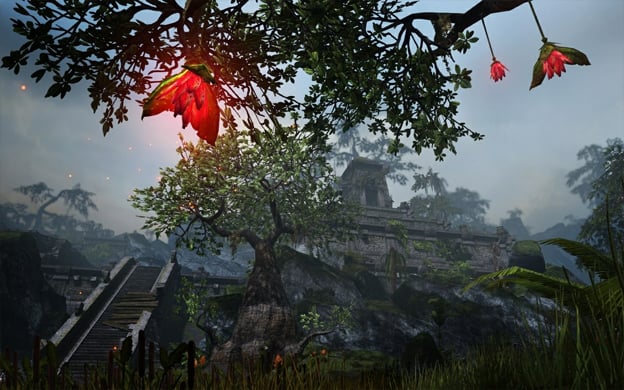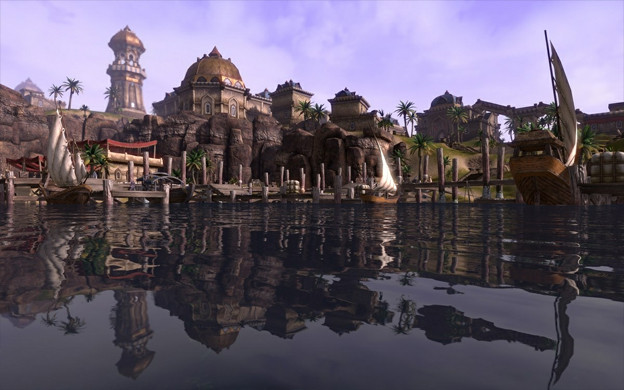The Elder Scrolls Online Hands-On Preview
| System: PC |  |
| Dev: Zenimax Online | |
| Pub: Bethesda Softworks | |
| Release: Q4 2013 | |
| Players: MMO | |
| Screen Resolution: 480p-1080p |
Fight for Your World, and Fight as Anyone
by Austin Wood
As a long-time fan of the Elder Scrolls franchise, I went into the Elder Scrolls Online both excitedly and tentatively. Sure, I was playing a brand new and entirely unique Elder Scrolls game, but I was also facing the possibility of having the iconic ES gameplay that I’d come to love torn away from me and substituted with an amalgamation of MMORPG clichés. As a result, my expectations were a bit pessimistic at times. That is, they were until the folks over at Zenimax showed me an adventure too enthralling to ignore and too engaging to enter hesitantly.
I never once felt out of place during my painfully brief time with ESO. My adventure began much the way you’d expect from an Elder Scrolls game: with detailed character customization. With a full nine races to enter (taken directly from Skyrim), three drastically polar factions to ally with (the Daggerfall Covenant, Ebonheart Pact, and Aldmeri Dominion), and three classes (Templar, Dragon Knight, and Sorcerer) to choose from, players will have every opportunity to make their hero exactly what they want. Character appearance is equally versatile, offering dozens of fully adjustable sliders and tones to fine-tune your character’s visage and physique.
However, after much deliberation, I begrudgingly turned away from the deep character creation and began my ESO escapades. The demo dropped me directly in front of Daggerfall, leaving an expansive forest to my left and a horde of Elder Scrolls canon to my right—both harboring countless activities.
Before anything, though, I had to actually build my character. This is where the MMORPG vibe began to shine through. Having begun the demo at Level 6 (out of a level cap of 50, provided possible expansions don’t raise the maximum level), I had several skill points to spend. Rather than staring into the stars to allocate my experience, I began looking through a series of skill menus. I had several types of points to spend: raw stat points to distribute between Health, Mana, and Stamina (which do exactly what you’d expect, and all regenerate naturally), as well as skill points to unlock combat abilities which could then be assigned to the UI’s hotkey bar.
This is where ESO truly began to impress. I’d taken up arms as a Dragon Knight for my initial ESO foray, but had access to far more than simple physical-damage skills, as the class’ title would suggest. Variety is key in the Elder Scrolls Online, and every last detail has been painstakingly tailored to create it. Every build, no matter how stylized, will have access to every combat trick in the MMO book. Crowd control, stuns, boons and de-boons, healing abilities, ranged damage, AOE attacks, conical melee attacks—it’s all at your fingertips. This allows each player to turn any class into any sort of character build. After all, everyone can use every type of weapon and armor.

That’s right; you can use anything. Sure, certain class and alliance choices will support certain weapons more effectively than others, but the fact remains that a Sorcerer can pick up a greataxe while an Orc tank reaches for a bow. Similarly, every player will have access to combat staples such as a dodge-roll, blocking ability (though shields are obviously the more advantageous blocking tools), and a method of breaking free of crowd control abilities that grants the player temporary immunity from them.
This versatility is reflected in the game’s equipment system as well. The game’s combat interface boils down to a hotkey bar with one item slot, five skill slots, and an “Ultimate” slot. The left mouse button is used for standard attacks, while the right is used to block. Although this is a solid foundation for an MMO combat system, it’s certainly not all to be had from ESO.
First off, two weapons can be wielded at once, and the player can switch between their two currently equipped options at any time. This effectively doubles the number of skills at a player’s disposal, increasing their ability to deal with various scenarios and enemies immensely. Combined with the universality of equipment choices, this creates an endless number of skill combinations. Up against dozens of dreg enemies? Slot a staff with crowd control and AOE spells, and go for a two-handed weapon for multi-hit attacks with high damage output. Maybe you just want to be an overtly sorcerer-y sorcerer? Just equip two staves and slot them with different spells. Oh, and all those crazy abilities? They’re all cooldown free.

You read that correctly. The only skills with cooldowns in ESO are Ultimate abilities. In an avant-garde departure from what was heretofore considered an MMO staple, skill availability is based solely on player reserves, namely mana and stamina. That can’t be taken at face value, mind you. Sure, you could spam abilities, but you’d quickly find yourself doubled over and running on empty.
And believe me, the wildly varied combat infrastructure is all too necessary. Confrontations in ESO are dynamic and fast paced, so the player has to be able to keep up. Whether you choose to play in the third-person overview, or the traditional first-person POV, players will soon find that there’s far more to monitor than your standard MMO. Auto-attacks are virtually non-existent, and enemies are always moving. You’ll have to make full use of every offensive and defensive ability in your repertoire and plan strategies accordingly to make progress in ESO.
Greatly refined combat aside, ESO is clearly an Elder Scrolls game at heart. So, although the game will offer colorful crafting and skill systems, let’s look at the meat of things: questing and dungeons.
Much like traditional Elder Scrolls games, the success of ESO’s storytelling and lore is based in the abundance but simultaneous straightforwardness of its tasks. At level 6, I already had dozens of quests (and quest types) available to me—all of which were clearly displayed on the game’s maps. The MMORPG infrastructure allows for easy navigation of various quest lines, so you’ll never be annoyed with accumulating dozens of incompletes.
Staying true to the immersion of the franchise, NPC interactions will be fully voiced and based on a subsequent feedback system in which the course of the conversation evolves according to player input. So, yes, you’ll still able to choose your response from a list of presets. This is yet another way that ESO achieves a balance between Elder Scrolls goodness and MMO innovation.

Dungeons are equally well executed, preserving the dungeon-crawl feel of the Elder Scrolls without succumbing to the monotony that is so frequently found in MMO distractions and diversions. The addition of public dungeons, which are designed to only be completed with groups, adds a welcomed level of interaction to PVE activities.
And there’s still the icing on the proverbial cake: The Elder Scrolls Online is gorgeous. I’m talking unabashedly Guild Wars 2-destroying visual fidelity. Armor detailing is intricate and eye-catching, and the iconic holds and castles of Elder Scrolls lore are shown in all their stonemason glory. The landscape draw distance is truly breathtaking, and the ESO world genuinely comes to life. Every last building was shown exquisite attention. I often found myself so stricken with the interior of a commonplace inn or pub that I’d simply stop to admire the woodwork and set pieces.
The ESO experience is further enhanced by the game’s colorful array of sounds. In a high-fiction universe—where fireballs clash with lightning bolts as often as sword does shield—believable sound effects are key. Luckily, the magic and melee effects of ESO sound familiarly Elder Scrolls-y but also fresh. Fire spells are distinctly burning flavored, and you’ll never mistake metal cleaving metal for a staff colliding with a tree.
Even in infancy, the Elder Scrolls Online has shown that the Elder Scrolls universe can be applied to the MMORPG genre. Zenimax Online has demonstrated the importance that the lore and canon has played in the game’s design, but it has also seized the opportunity to improve the game’s flow. Though much is left to be fleshed out, ESO definitely looks ready to become the next big MMO.
 | By Austin Wood Social Media Manager Date: May 30, 2013 |
Game Features:
